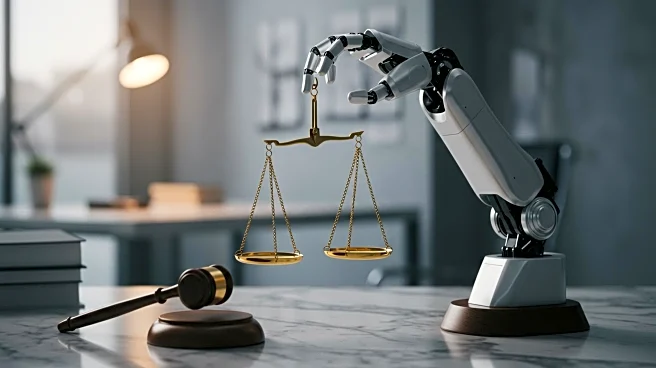What is the story about?
What's Happening?
The legal profession is increasingly integrating generative AI tools into its practices, marking a significant shift from traditional methods. Historically, the legal field has been cautious about adopting new technologies due to compliance and ethical concerns. However, recent developments show that AI is being actively used to augment legal work, making it faster and more strategic. A survey conducted by Bloomberg Law reveals that 63% of attorneys have utilized AI in their work, primarily for legal research, drafting communications, summarizing case law, and reviewing documents. Despite the widespread adoption, more complex tasks like contract negotiation remain largely untouched by AI due to concerns about data security and professional responsibility.
Why It's Important?
The integration of AI in legal practice represents a pivotal moment for the industry, potentially transforming how legal services are delivered. By automating routine tasks, AI allows lawyers to focus on higher-value activities, enhancing efficiency and output quality. This shift could lead to cost savings for law firms and clients, as well as improved access to legal services. However, it also raises questions about the future role of lawyers and the ethical implications of relying on AI for legal decision-making. As AI becomes more prevalent, legal professionals must navigate the balance between leveraging technology and maintaining the integrity of their practice.
What's Next?
As AI tools continue to evolve, legal firms and departments are likely to further integrate these technologies into their workflows. This will involve establishing safeguards and expectations to ensure responsible use. The focus will be on how attorneys can best utilize AI while addressing concerns about accuracy and ethical implications. Additionally, ongoing discussions about AI's role in complex legal tasks may lead to new standards and practices within the industry. Legal professionals will need to adapt to these changes, potentially reshaping their roles and responsibilities.
Beyond the Headlines
The adoption of AI in legal practice may have broader implications for the profession's culture and training. Junior attorneys might experience changes in their learning processes, as AI handles foundational tasks, potentially accelerating their exposure to strategic responsibilities. This could alter traditional career paths and expectations within the industry. Furthermore, the use of AI raises ethical questions about the reliance on technology for legal reasoning, prompting discussions about the profession's future and the need for updated regulations.















